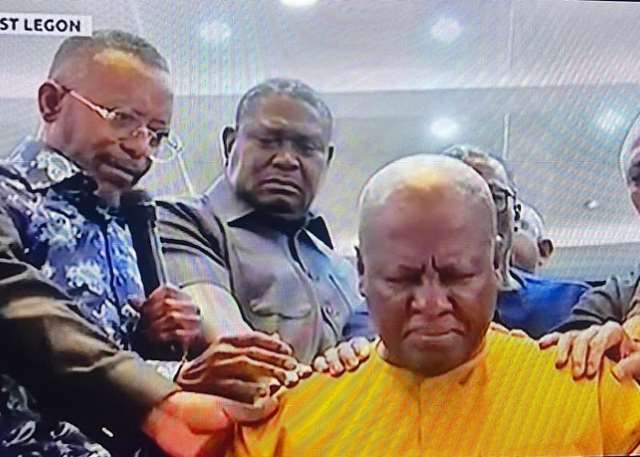The “Ashanti Crusaders for the NDC,” a pressure group associated with the National Democratic Congress (NDC), has publicly voiced dissatisfaction regarding a recent interaction between its flagbearer, John Dramani Mahama, and Rev. Isaac Owusu Bempah. This encounter is particularly troubling for the group, considering Rev. Owusu Bempah’s previous remarks about Mahama, where he accused him of having “blood on his hands” and declared that Mahama would never ascend to the presidency again. The inconsistency in the pastor’s position, now offering spiritual support to Mahama, has sparked confusion and concern among the members of the Ashanti Crusaders.
The pressure group has taken a critical stance on the leadership of the NDC, demanding an explanation for allowing Rev. Owusu Bempah to engage with Mahama. They label the pastor as a “spiritual curse” and a supporter of the NPP (New Patriotic Party), implying a betrayal of the party’s values by permitting him to lay hands on their candidate. Such an act is perceived by the Crusaders as detrimental to the party’s image and credibility, raising questions about the implications of Mahama’s acceptance of this spiritual intervention.
Amid their concerns, the Ashanti Crusaders are particularly troubled by the possibility that Mahama’s willingness to receive blessings from Owusu Bempah could be construed as an acknowledgment of the pastor’s past accusations. The group seeks clarity on whether this interaction signifies Mahama’s acceptance of the allegations made against him, leading to further doubts about his integrity and leadership capabilities. They express a need for transparency within NDC leadership to address the ramifications of this meeting.
Moreover, the Ashanti Crusaders emphasize the importance of maintaining a clean distance from figures they perceive as potentially harmful to the party’s reputation. They caution the NDC leadership to be vigilant about associating with individuals who have publicly cast doubts on the party’s candidates, especially those who have made disparaging remarks about Mahama in the past. Their warning reflects a broader concern about the need for strategic alliances and the importance of safeguarding the party’s public image ahead of elections.
The skepticism directed at Rev. Owusu Bempah stems not only from his previous statements but also from a cultural context where spiritual leaders hold significant sway over public opinion. The Ashanti Crusaders are aware that affiliations with certain spiritual figures can have long-lasting impacts on political fortunes, particularly in a highly polarized electoral environment. Thus, they frame their concerns not only as personal grievances but as critical to the broader survival and success of the NDC.
In conclusion, the ongoing discourse sparked by Mahama’s encounter with Rev. Owusu Bempah reflects deeper tensions within the NDC, as factions within the party grapple with issues of leadership, integrity, and public perception. The Ashanti Crusaders for the NDC are calling for introspection and decisive action from their leaders to ensure that their party remains anchored in its values and maintains trust among its supporters. The delicate balance between political strategy and spiritual affiliations is now a focal point as the NDC prepares for upcoming electoral challenges.














